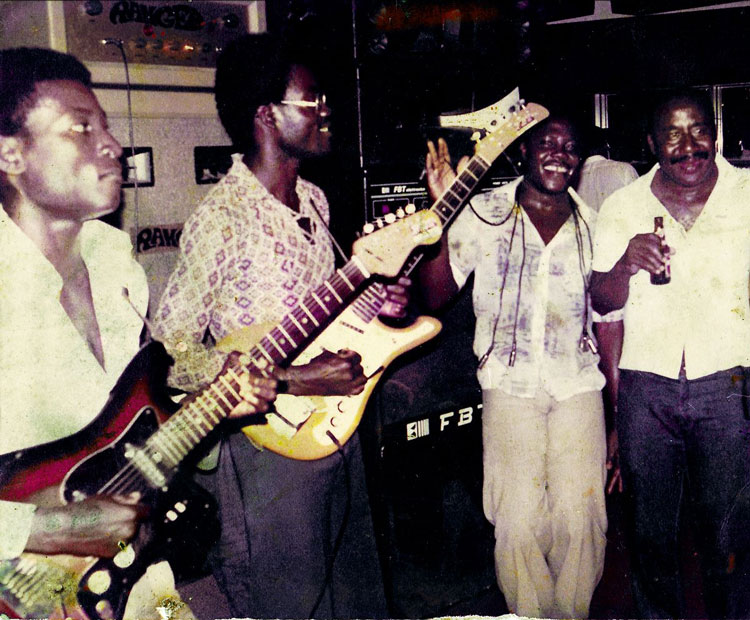Conjunto África Negra was conceived in the early 1970s, when a butcher from the town of São Tomé (the capital city of the island nation of São Tomé and Príncipe) named Horacio, and his guitarist friend Emilio Pontes wrote songs, played guitar, and relaxed after work. After brief periods under various names, Conjunto África Negra (Black Africa ensemble) officially formed in 1974, quickly achieving notoriety across the islands, a year before São Tomé & Principe became independent from Portugal in 1975.
The band brought forward the fiery funk of lead guitarist Emidio Vaz; the rhythm guitar of Leonildo Barros; and the charismatic former Conjunto Cabana singer, Joao Seria, also known as “The General” because of the military beret that he wore during concerts.
África Negra began playing at Fundões, the popular street dances in São Tomé, where África Negra brought together São Tomé’s diverse communities of Creoles, Cape Verdeans, Angolans, and Mozambicans who came to work on the island’s busy coffee and cocoa plantations.
Following in the paths of leading São Toméan pre-independent groups such as Leoninos and Os Úntuès, África Negra combined influences of the influential central African guitarists with São Tomé rhythms África Negra released its first album, Aninha in 1981.
During the 1980s, África Negra included up to 12 musicians, including a rarely seen four-piece horn section. The band recorded most of its material at the studios owned by the national network, Rádio Nacional de São Tomé. However, the ensemble was too large to fit inside the small recording booths and had to record in the courtyard.
África Negra recorded 3 albums in 1983, including “Alice”, featuring a wide range of musical influences, including the high energy Puxa, a traditional island rhythm. In 1986, África Negra released the six-track cassette “San Lena”.
Throughout the 1980s and 90s, the band’s distinctive mix of Puxa rhythms and socially charged, lyrical tales, made it the leading São Toméan band travelling abroad at the time. They regularly toured Angola, Mozambique, Gabon, Cameroon, Nigeria, Portugal, Cape Verde, with such success that in 1989 three members decided to relocate to Cape Verde, including Joao Seria, leading to a series of drastic lineup changes throughout the 1990s. Regardless of this, África Negra would go on to release 4 albums including 3 cassettes between 1990-91, and an additional three CDs between 1995-96 before disbanding in 1996.
África Negra released over fifteen studio albums throughout its 50-year career.
África Negra got back together in 2012 with several original members including Seria and Barros.
In 2022, Bongo Joe Records released the África Negra compilation “Antologia Pt.1”, available on CD, vinyl and digital.


